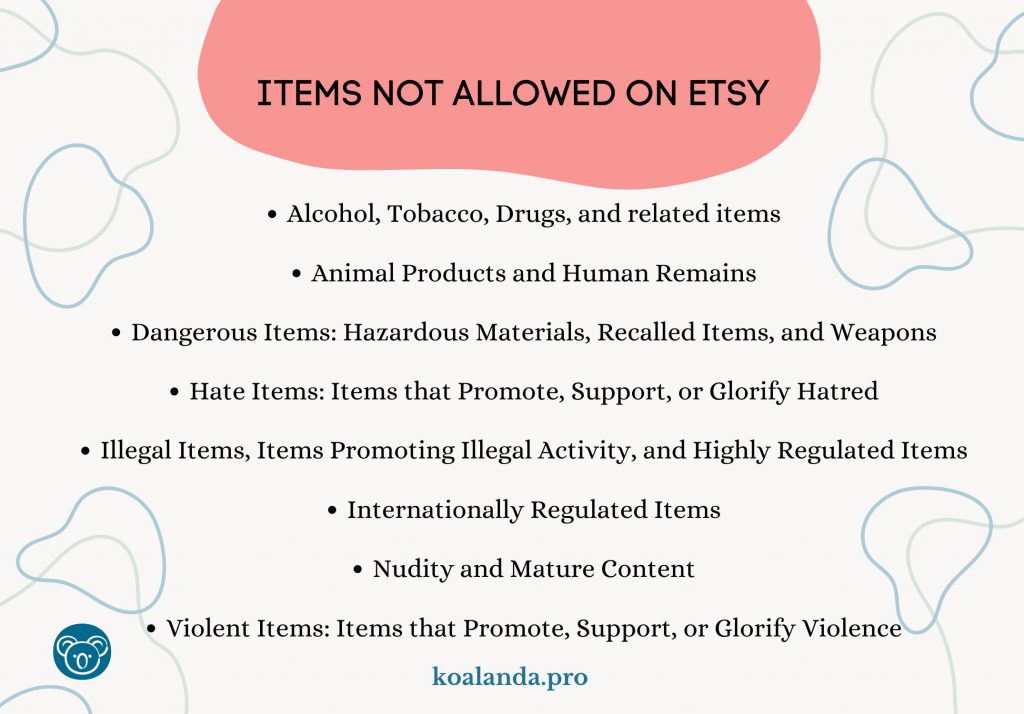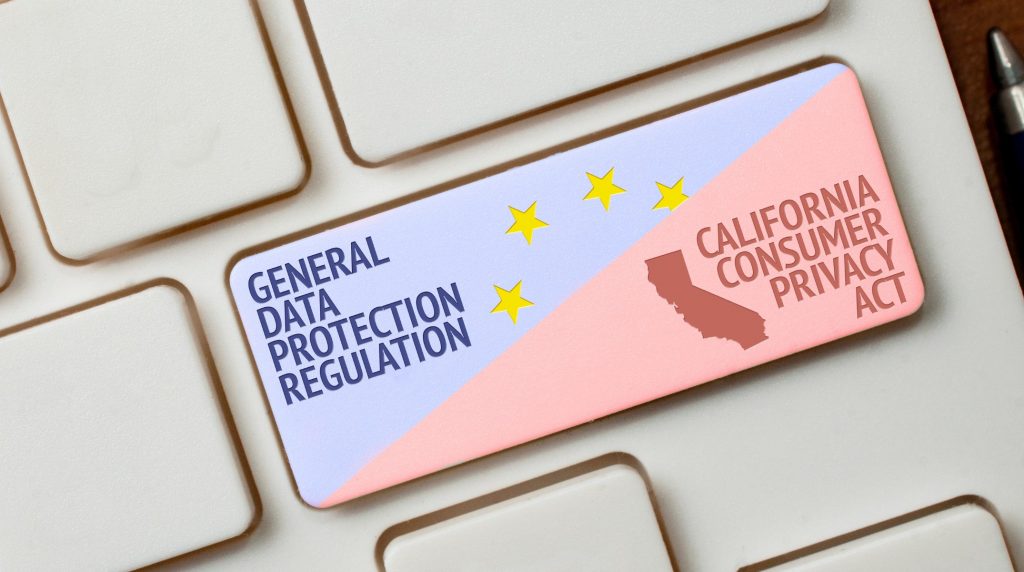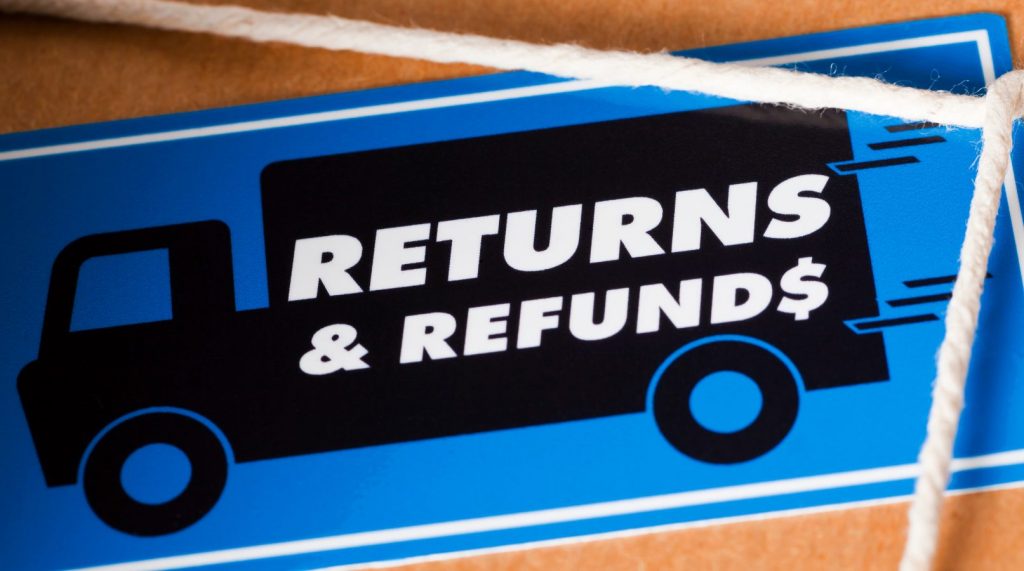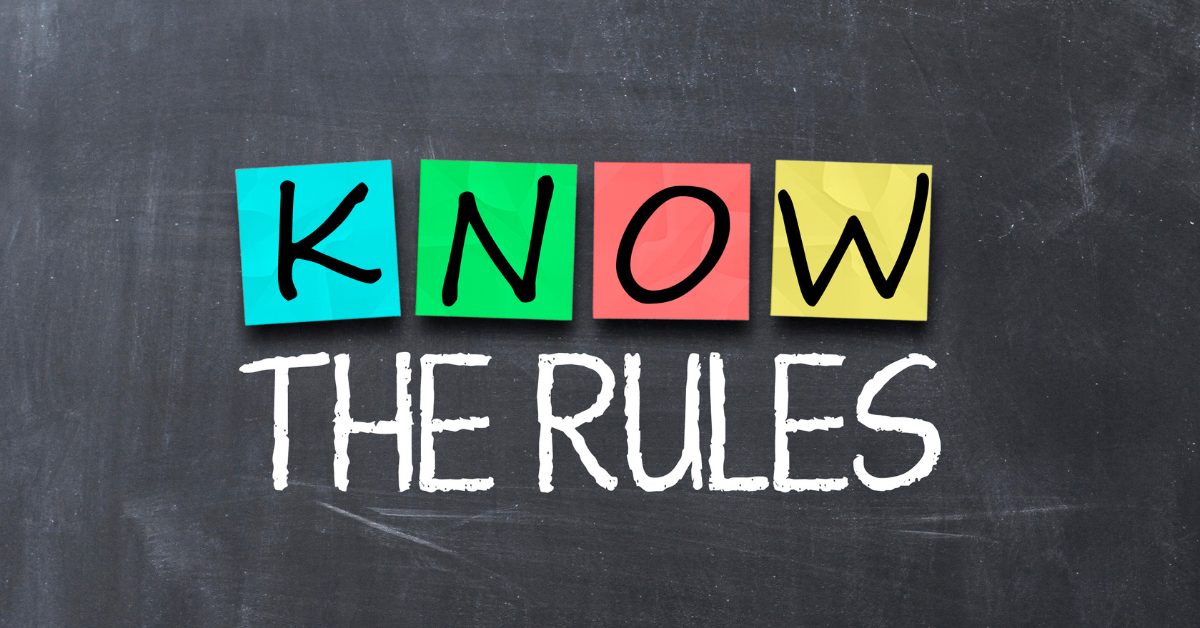One of the most common questions that we see from Etsy sellers is “Why did my listing get removed?” or “Why was my Etsy shop closed?”. In the majority of cases the answer is surprisingly simple – there was a violation of Etsy’s rules. As an Etsy seller, it’s essential to be aware of the platform’s rules and guidelines, as they help you create a successful and enjoyable experience for both you and your customers. Not following them can lead to some unwanted consequences, like misunderstandings with fellow sellers, brands, or even the closure of your shop.
Don’t worry, though; we’ve got you covered! In this blog post, we’ll explore the most important rules for selling on Etsy in an easy-to-understand manner. By keeping these guidelines in mind, you can build trust with your customers, foster a positive atmosphere, and enjoy long-lasting success in the unique and vibrant Etsy community. Let’s dive in!
Table of Contents
Prohibited items
The first step is to be aware of the types of items that are not allowed on the platform. By ensuring that your products comply with Etsy’s policies, you not only protect your own shop from potential issues but also contribute to maintaining a safe and welcoming marketplace for everyone. In this section, we’ll delve into the list of prohibited items on Etsy and provide some helpful tips to keep your shop in good standing.
Items not allowed on Etsy

1. Alcohol, Tobacco, Drugs, and related items
Prohibits the sale of alcohol, tobacco products, drugs, drug paraphernalia, and medical drugs/devices. It also restricts items that make health claims without proper approval or items that promote drug use or excessive alcohol consumption.
2. Animal Products and Human Remains
Restricts the sale of live animals, products made from endangered or threatened species, cat/dog parts or pelts, and ivory or bones from ivory-producing animals. Prohibits items made from human remains, except for teeth, fingernails, and hair.
3. Dangerous Items: Hazardous Materials, Recalled Items, and Weapons
Bans hazardous materials (such as explosives, flammable items, radioactive material, and toxic substances), recalled items or items posing health/safety hazards, and weapons (including guns, knives, imitation firearms, and plans/instructions for creating weapons).
4. Hate Items: Items that Promote, Support, or Glorify Hatred
Prohibits items promoting, supporting, or glorifying hatred towards protected groups based on race, ethnicity, national origin, religion, gender, gender identity, disability, or sexual orientation. This includes items related to hate groups and those containing racial slurs or derogatory terms.
5. Illegal Items, Items Promoting Illegal Activity, and Highly Regulated Items
Disallows illegal items, stolen items, counterfeit goods, personal information, highly regulated items (e.g., currency, real estate), and listings that facilitate or promote illegal activities such as impersonation, evasion of detection, or fraudulent deception.
6. Internationally Regulated Items
Requires compliance with local and international laws, including export and import regulations, licensing, and documentation when buying or selling items across borders. Sellers must adhere to economic sanctions and trade restrictions implemented by organizations like OFAC.
7. Nudity and Mature Content
Restricts pornography and exploitative items, and requires proper listing and tagging for mature content (e.g., depictions of human genitalia, sexual activity, profane language, and violent images). Items promoting the sexualization of minors, bestiality, incest, and non-consensual sex are prohibited.
8. Violent Items: Items that Promote, Support, or Glorify Violence
Prohibits items that promote, support, or glorify acts of violence or harm towards oneself or others, including items that glorify human suffering or tragedies, exploit natural disasters, encourage violence against individuals or groups, or promote self-harm and harmful misinformation.
Consequences of listing prohibited items
Listing prohibited items on Etsy can lead to a variety of negative consequences for your shop and reputation as a seller.
- Listing removal: Etsy may remove the offending listings from your shop without prior notice. This can result in a loss of time and effort invested in creating those listings, as well as potential revenue.
- Account suspension or termination: In severe cases or for repeated violations, Etsy may choose to suspend or terminate your selling privileges. This can lead to the permanent closure of your shop.
- Legal issues: Selling prohibited items may expose you to potential legal consequences, including fines, penalties, or lawsuits from intellectual property owners, regulatory agencies, or other affected parties.
- Loss of customer trust: Listing prohibited items can damage your reputation among buyers and other members of the Etsy community.
If you have any doubts that your items fall into some of the categories listed above, read the official Etsy Prohibited Items Policy. If necessary, contact Etsy’s support for more details.
Intellectual property rights
Etsy takes intellectual property rights very seriously. This means that the platform complies with intellectual property laws and industry best practices to maintain the integrity of their creative marketplace.

So, what does this mean for sellers and buyers? Essentially, it means that Etsy wants to ensure that the products and content listed on their platform don’t infringe on anyone else’s intellectual property rights. If someone reports an infringement, Etsy will investigate and take appropriate action, which may include removing the listing. If a shop breaks these rules repeatedly then it is very likely that it will be closed.
Some specific examples of intellectual property infringements that can happen on Etsy include:
1. Trademark infringement
Occurs when a seller uses a trademarked name, logo, or slogan in their listings or shop without permission from the owner of the trademark. For example, a seller using the Nike logo or the phrase “Just Do It” in their products without permission from Nike would be infringing on Nike’s trademark rights.
2. Copyright infringement
Occurs when a seller uses copyrighted material, such as images or text, without permission from the owner of the copyright. For example, a seller using an image from a popular movie or TV show in their product without permission from the copyright owner would be infringing on their rights.
3. Patent infringement
Occurs when a seller creates and sells a product that is covered by someone else’s patent without permission. For example, if a seller creates a phone case with a unique design that is already patented by another company, they would be infringing on that company’s patent rights.
4. Design infringement
Occurs when a seller creates and sells a product that is a copy or imitation of someone else’s original design. For example, if a seller creates a jewelry piece that looks identical to a popular designer’s piece, they would be infringing on the designer’s design rights.
It’s important not to be swayed or enticed by the fact that there are plenty of listings on Etsy that blatantly violate intellectual property rights. These shops and listings are routinely shut down by Etsy, and the risk of having your own shop closed down is significant. Given the amount of time and effort required to build a successful Etsy shop, it simply isn’t worth jeopardizing your hard work by taking such risks.
Privacy and data protection
As a seller on Etsy, it is important to handle customer information securely. This includes collecting, storing, and using customer data in compliance with Etsy privacy policy. Sellers should also be transparent with customers about their data practices, and should respond promptly to any customer requests regarding their personal information.

In addition to having a clear privacy policy, it is important to comply with data protection regulations when handling customer information. This includes complying with applicable laws such as the General Data Protection Regulation (GDPR) in the European Union and the California Consumer Privacy Act (CCPA) in the United States.
Returns and refunds
Returns and refunds are an important aspect of running an Etsy shop. Etsy doesn’t have special rules for handling returns and refunds. Instead, sellers are obliged to conform to the laws of the countries in which they sell their products (i.e. the country of the buyer).

Not all Etsy sellers are obliged to accept returns and provide refunds. It largely depends on the seller’s policies, as well as local laws and regulations. In the United States, for example, there is no federal law that requires sellers to accept returns or provide refunds. However, some states have their own laws governing returns and refunds.
In the European Union, consumers have a right to return goods within 14 days of receiving them, for any reason. This is known as the “cooling-off period”. During this time, consumers can inspect the goods and decide whether they want to keep them or return them for a refund. If the consumer chooses to return the goods, the seller must provide a refund within 14 days of receiving the returned goods. Failure to do so can result in penalties.
There are some circumstances where a return can be rejected. Most notably, sellers are not obliged to accept returns of personalized or custom-made items, unless they are damaged during shipping.
Rules for Email marketing
You may be tempted to use customer email addresses to send marketing messages, but it’s important to follow Etsy’s rules for email marketing to avoid any penalties or suspension of your account.

Firstly, it’s essential to obtain explicit consent from customers before adding them to any email marketing lists. You cannot add customers to your email list simply because they have made a purchase from your shop.
In addition, all emails must include a clear and easy-to-use unsubscribe link that allows customers to opt-out of your email list at any time. Once a customer unsubscribes from your list, you must immediately remove them from your email list and stop sending them marketing emails.
It’s also important to note that any emails you send to customers must comply with all applicable laws and regulations, including anti-spam laws such as the CAN-SPAM Act in the United States or the GDPR in the European Union.
Conclusion
Following Etsy’s rules and guidelines is crucial for maintaining a successful and legal shop on the platform. As a seller, it is important to understand and comply with Etsy’s policies regarding prohibited items, intellectual property rights, privacy and data protection, customer complaints and returns, and email marketing. By doing so, sellers can avoid consequences such as account closure or legal action, and ensure a positive experience for themselves and their customers.






Do shop owners on Etsy not have rights as Consumers as well? I mean, aren’t they purchasing a service or something similar from Etsy? And what is the benefit of using Etsy versus having your own site? Is it for the traffic that is already established there? I ask because there is a LOT in Etsy’s TOS that would make me look elsewhere before I signed up with them and I would ABSOLUTELY put Etsy terms and such beside any other company that might a third party marketplace. There are horror stories all over the web of shops that were shut down with no warning over what was perceived as a violation to start but later was found to have been shutdown to quickly. They don’t tell ppl what their supposed violation is and how can any serious business owner give a nameless faceless (and more importantly, impossible to communicate with) entity so much power that they can, without compunction shut your shop down, accuse of some violation, and refuse to disclose the information in order for you to defend yourself against the accusations. Etsy regularly violated Consumer rights and their own contracts in the US. And all you need to do is research a little to find that even with “Consumer protection” laws there’s very little a seller to make Etsy accountable for their hubris (and even less a buyer can do even if Etsy is CLEARLY wrong.).
Shop owners have no rights on etsy. Etsy also over shadows your brand. If you ask someone where they got an item from they say etsy not, oh I got it from “insert shop name” on etsy.
I started an etsy shop in June. In August I got my first sale, before the sale was even finalized my shop was suspended without reason. I first contacted the buyer to let them know what happened had had their item shipped within the hour. Then I contacted etsy their response was that my shop was suspended in error whoops. That suspension glitched everything I couldn’t read updates or forums it took a week for them to “fix it”. I got another sale in September it went well no issues. My 90 day probationary period was almost over at this point so the slapped my shop with a reserve hold.December 9th and 10th I got 2 sales because it’s Christmas, on December 24th my shop was suspended permanently with no reason given. I appealed again and within 15 minutes my appeal was denied. The phone number they give you is not monitored so you never get a call back. Once they deny your appeal they don’t answer emails and all the live chat links are removed. Etsy has shady business practices against shop owners and the rules don’t matter. Others have said when this happened to them they waited a few weeks and their shop miraculously returned after a few weeks.
Etsy also has legal clauses in all their communications that you can’t share the communications. Yeah I won’t be back on etsy I will forge my own path.